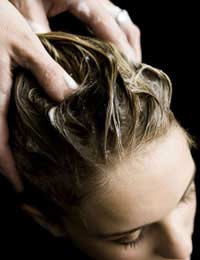
Looking after your hair and scalp is essential to maintaining a good standard of personal hygiene. Keeping your hair clean, shiny and strong means healthy hair that is in good condition. Some hair and scalp conditions such as dandruff and head lice, although may not be avoidable in all cases, can be minimised, as can the risks of developing infections as a consequence, by maintaining good hair hygiene.
Hair is made up of keratin, which is a live organism. It grows from roots in the scalp called follicles which are kept naturally lubricated by a substance called sebum. Everyone produces different amounts of sebum, leaving people with dry or greasy hair, or sometimes even a combination of the two.
Brittle Hair
If your hair snaps when brushed, is becoming frizzy and is generally looking and feeling dry, you are probably suffering from brittle hair.
Dry and brittle hair is a very strong sign that hair is not in good health and can be caused from over exposure to the sun, lack of use of conditioner or may be due to ethnic background.
Poor nutrition can account for brittle hair, so increase the amount of protein taken in the diet, along with additional fruit and vegetables and oily fish which contain high levels of essential fatty acids needed for healthy hair to combat this. Certain medications and medical conditions such as those of the thyroid can contribute towards brittle hair; ask your doctor if there is another alternative to your medication.
To over come brittleness of hair, drink plenty of water to ensure the scalp is not becoming dehydrated and causing hair to become dry, massage the scalp regularly with clean fingers to increase blood flow to the area, which brings a healthy supply of oxygen and nutrients.
There are many products available that are tailored to the individual needs of hair, whether it be for dry, curly, coloured etc, try to find a brand and type that is designed for your needs.
Hair Loss
The average person has a natural loss of around 90 hairs a day, although there are a range of factors that can significantly increase this loss.
Asides from genetic reasons, two of the main reasons hair can be lost are stress and diet. It is important to keep stress levels at an acceptable level as stress can cause the tiny blood vessels of the scalp to constrict, resulting in a lack of oxygen and vital nutrients to the roots.
The diet is an important part of maintaining healthy hair, and to keep keratin levels high, a diet rich in proteins must be taken; lean meats, nuts and seeds are good sources of protein. People who suffer with anorexia often find they lose hair in large amounts.
The scalp is very rich in copper levels and with age comes a fall in the quantity of copper available for the scalp, therefore hair is at a higher risk of falling out.
Damage to the Hair and Scalp
There are many factors that can damage the hair. Mechanical reasons can include excessive brushing, pulling at knots, using a fine comb in thick and tangled hair, or even brushing hair when wet; hair is more prone to damage when wet due to changes in its elasticity.
Chemical damage can result from using perm solutions and dyeing agents. Environmental reasons such as exposure to UV light, which can be either naturally from the sun or from equipment used by a salon.
Thermal appliances are also to blame for causing damage to the hair. Straighteners, curling tongs, over use of hair dryers all have the potential to burn the hair and decrease water content. Try not to use every day and find a protective styling product that aims to coat the hair and shield it from heat damage.